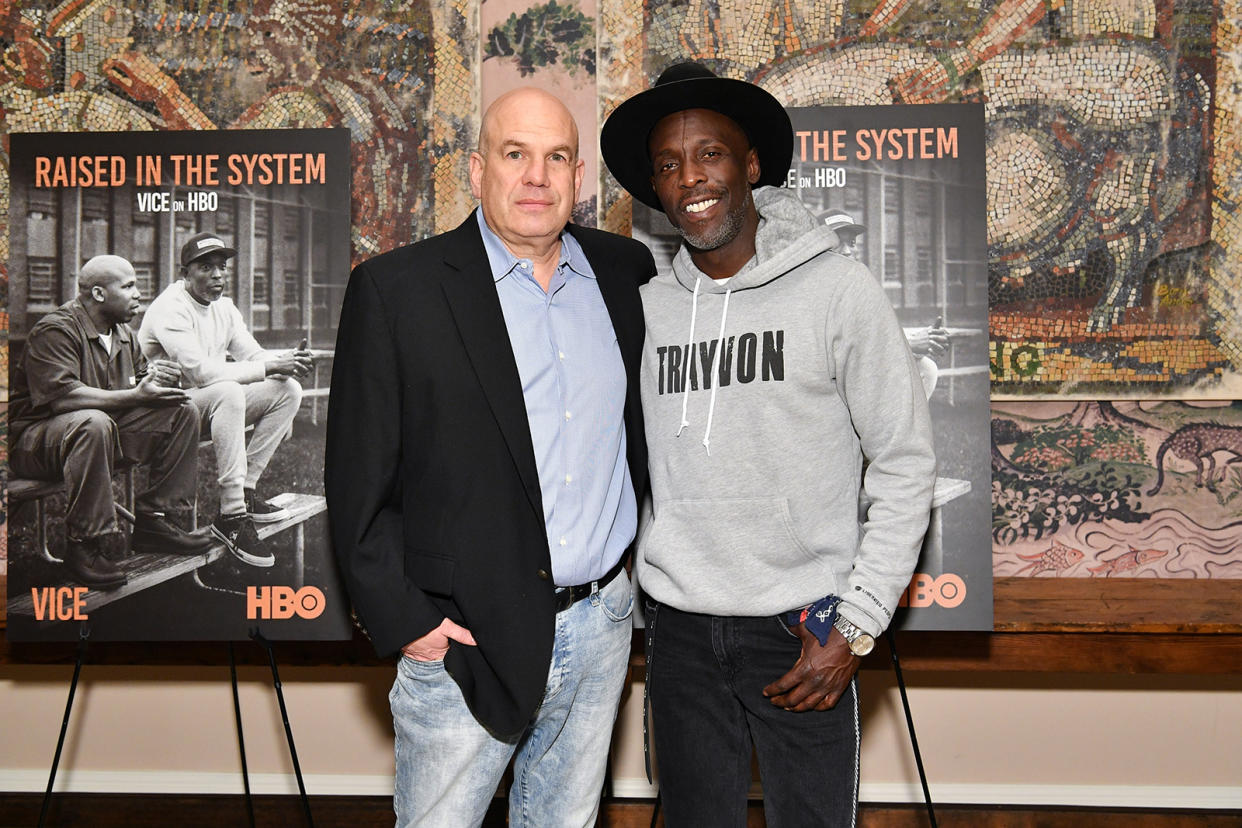Dealer charged in Michael K. Williams’ overdose death sentenced to 2.5 years after call for leniency

- Oops!Something went wrong.Please try again later.
- Oops!Something went wrong.Please try again later.
NEW YORK — A Manhattan judge sentenced one of the dealers charged in Michael K. Williams’ overdose death to a 2 1/2 year prison term Tuesday after hearing from the beloved actor’s nephew, who asked both for justice for his uncle and leniency for the man accused of selling the drugs that claimed the star’s life.
Dominic Dupont became overwhelmed as he spoke about calling Williams’ mother after finding him dead in his penthouse apartment in Williamsburg, Brooklyn, on Sept. 6, 2021. The city medical examiner later determined Williams died of an overdose of fentanyl, heroin and cocaine.
Dupont said he felt similarly torn when he thought about the driving factors that led to an illiterate Carlos Macci selling fentanyl-laced heroin on Brooklyn streetcorners while approaching age 70.
“When I think about the letters that you’ve received and I think about all of the challenges that exist for people who have had similar challenges like Mr. Macci, challenges like poverty and substance abuse disorders and a lack of services,” Dupont said, “I say to myself that those things are real. And I also say to myself, what can we do to assist people who are dealing with those things?
“We have a responsibility to help people who are victims,” he continued. “And (people) dealing with these challenges, help them understand that selling poison to people is not right.”
Dupont repeated some of the life lessons his uncle instilled in him.
“What is some of the things that I can do to fix myself, to fix my life?” Dupont said. “That’s one of the most impactful things I ever learned form my uncle — don’t be me; be better than me.”
Manhattan Federal Court Judge Ronnie Abrams thanked Dupont for his “incredibly thoughtful and insightful remarks,” imposing a lenient term of 30 months in prison followed by three years of supervised release. Macci must spend one of them at an inpatient drug treatment facility.
“I don’t think people need to be defined by the worst mistake they ever made,” Abrams said. “You still have a chance to define yourself in a positive way.”
Before the sentencing, Macci told the court, “I would like to say I’m sorry, Your Honor, for what has happened.”
Macci, 72, who pleaded guilty to narcotics conspiracy in April, had faced up to 17 years in prison. His lawyer Benjamin Zeman said he was a loving relative and community member but suffered deeply from mental and physical issues and had long been addicted to the deadly drugs he sold. He left school in the second grade.
He was one of four men charged with drug offenses by the Manhattan U.S. attorney’s office over Williams’ tragic death in February 2022. Prosecutors said Williams bought the drugs from the crew the day before his arrest, and that they continued dealing heroin laced with fentanyl in “broad daylight” after it killed him. Irving Cartagena, Hector Robles and Luiz Cruz previously pleaded guilty to charges in connection with the case and are awaiting sentencing.
A Flatbush native, Williams had millions of fans worldwide who watched him in critically acclaimed shows like “Boardwalk Empire” and “The Wire,” in which he played the vigilante stickup specialist Omar.
In real life, he was a dedicated anti-violence activist who devoted countless hours to mentoring young people and improving police-community relations. Williams spoke passionately about his struggles with drug addiction before he broke into show business and after he rose to fame on HBO’s groundbreaking hit series set in Baltimore.
“I was playing with fire,” the actor told the Newark Star-Ledger in 2012, discussing how he used to score drugs in dangerous neighborhoods.
“It was just a matter of time before I got caught and my business ended up on the cover of a tabloid, or I went to jail or, worse — I ended up dead.”
In a letter to Abrams before sentencing, the show’s creator joined Williams’ nephew in urging the court to exercise leniency in Macci’s case.
“Mike was always aware that addiction and the impulse toward addiction would remain a constant in his life,” David Simon wrote.
“He spoke of it to me bluntly at points, and he never discounted the threat. At the same time, in all of his address of these struggles, Michael always declared that he was responsible for himself, that the decision whether to use or to cease using would always be his own,” he continued.
“When one of his previous sources of supply — not a dealer, but a co-user — was discovered to have some proximity to our film sets, Michael insisted that the matter was to be addressed by changes in his own behavior rather than anything punitive to anyone else. I never failed to see him take responsibility for himself and his decisions.”
_____

